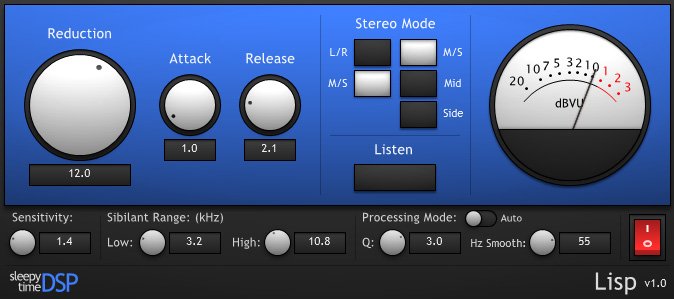Lisp
size 0.75 MB / 0.80 MB
Lisp is a level-independent sibilance processor.
Whether you use a traditional de-esser, sidechained compressor, dynamic EQ, or even edit your tracks manually, cleaning up sibilance problems in your vocals can get pretty tedious. Lisp is new type of de-esser that aims to speed-up this process with its automatic sibilance detection algorithm.
Internally tuned to the human vocal range, Lisp can automatically detect and lower annoying “ss”, “teh”, and “ch” sounds in your audio by tracking both the amplitude and pitch of its input in real-time. Just set the reduction amount and let Lisp do the rest!
Lisp’s internal algorithm doesn’t rely on traditional threshold/frequency-based techniques found in most current de-essing systems. Instead, it uses a modified form of the Sleepy-Time Records transient detection algorithm (previously found in the KVR-DC2012 entry: Transient) coupled with fast frequency detection and phase-cancellation methods to remove unwanted sibilance, regardless of the input level. The result is a very natural and pleasing vocal with harsh “s” sounds under control no matter what distance the singer is in relation to the microphone. Not only that, but the entire process is highly CPU efficient, allowing you to use more instances in your project.

![]()
![]()
STDSP_Lisp ( 0.75 MB )
STDSP_Lisp_x64 ( 0.80 MB )

